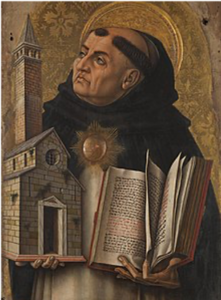Hi everyone– here is my adult study lesson I would have taught tonight at church. Read it over and ponder it. Discuss it with your spouse, or as a family. Read it over coffee tomorrow. Whatever works for you!
St. Thomas Aquinas, Doctor of the Church

Dates: 1225-1274 A.D.
Locations: Paris, France; Cologne, Germany; Rome, Italy
Feast Day: January 28
Context: St. Thomas Aquinas was an Italian Catholic priest, Dominican monk, and scholastic theologian considered one of the greatest minds of the medieval era. He was born in Italy in 1225 to Christian parents of southern Italian nobility. He was educated at a Benedictine monastery and at a university in Naples, where he was introduced to the writings of philosophers such as Aristotle and Maimonides. At the age of nineteen, Thomas resolved to join the Dominican Order of Preachers, which greatly displeased his family. After becoming a Dominican monk, he pursued further study at the University of Paris and later taught in Cologne. He began writing and publishing prolifically, in addition to his lectures and university debates. He also composed Eucharistic hymns which are still sung today. His magnum opus, the Summa Theologica, is a systematic synthesis of Aristotelian philosophy and Catholic doctrine. The work is presented in the familiar scholastic form: a question is posed, answers are given, a conclusion is reached, and objections to the conclusion are rebutted. Aquinas’ erudition and scholarship were rivalled by his saintly devotion to God. On a few occasions, it was reported that he levitated in prayer and had ecstatic experiences of God. After one such mystical experience, Thomas came to believe all he had written was “like straw.” He therefore never finished the Summa. After striking his head on the branch of a fallen tree during a journey, he became ill and died in 1274 at the age of 48. The thesis of Thomas’ theology was that the purpose of human existence is union and fellowship with God, culminating in the Beatific Vision—when one sees God face to face, knowing God as one is known, and enjoying Him forever.
Excerpt from: The Summa Theologica, Article 8
Whether any created good constitutes man’s happiness?
Objection. Man is made happy by that which quiets his natural desire. But man’s natural desire does not reach out to a good surpassing his capacity. Since, then, man’s capacity does not include that good which surpasses the limits of all creation, it seems that man can be made happy by some created good. Consequently some created good constitutes man’s happiness.
On the contrary, Augustine says: “As the soul is the life of the body, so God is man’s life of happiness: of Whom it is written: ‘Happy is that people whose God is the Lord’ (Psalm 143:15).”
I answer that, It is impossible for any created good to constitute man’s happiness. For happiness is the perfect good, which quiets the appetite altogether; else it would not be the last end, if something yet remained to be desired. Now the object of the will, i.e. of man’s appetite, is the universal good; just as the object of the intellect is the universal true. Hence it is evident that naught can lull man’s will, save the universal good. This is to be found, not in any creature, but in God alone; because every creature has goodness by participation. Wherefore God alone can satisfy the will of man, according to the words of Psalm 102:5: “Who satisfieth thy desire with good things.” Therefore God alone constitutes man’s happiness.
Discussion:
• What do you think of the format of Aquinas’ writing? What do you like about it? What do you dislike?
• Is it possible for any created good to establish human happiness? What things do we look to for happiness? Where do you really find it?
• Why do you think we focus so much on happiness as human beings? Why is that our goal?
• Thomas says that God perfectly fulfills our happiness, so that in knowing Him we can desire nothing else. What would it look like to live our life as if God was our only desire?


Comments are closed.